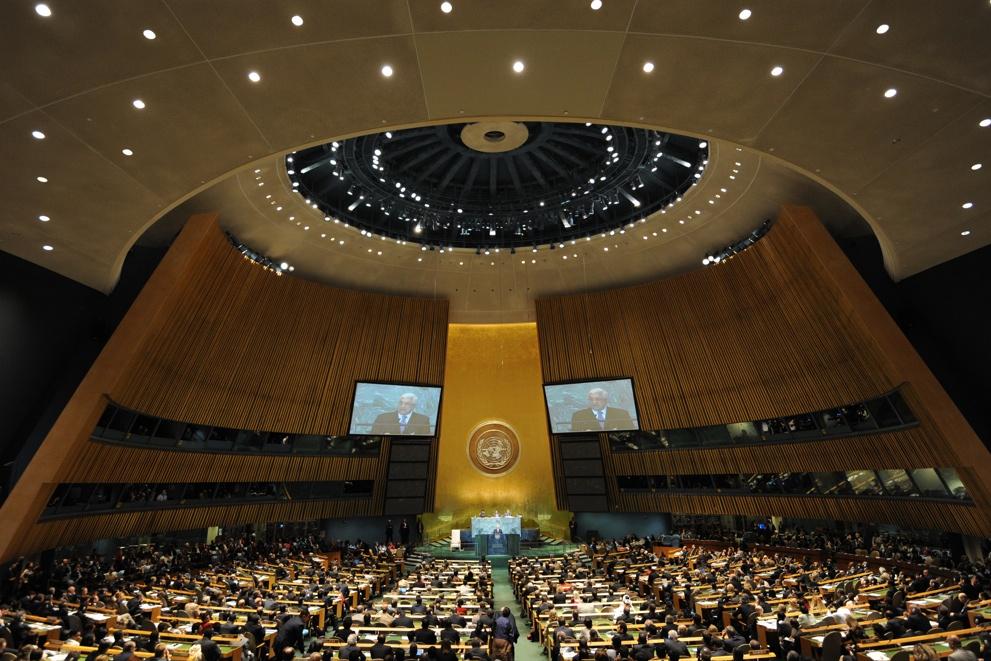The pointless Palestinian UN bid
Mahmoud Abbas, President of the Palestinian Authority, speaks during the United Nations General Assembly on Sept. 23, 2011 in New York.
JERUSALEM ― Faced with what appears to be an inevitable UN General Assembly vote recognizing Palestine as a “full nonmember observer state,” Israel has drawn back from its recent warnings that it would annul the Oslo Accords in response.
Israel had threatened to cancel the Oslo Accords, the all-important framework for Israeli-Palestinian negotiations, if the Palestinians persisted with their UN bid.
Israel sees the maneuver as an explicit violation of the Accords, which require a negotiated resolution to any outstanding claims or disputes, including final border definitions, resolution for refugees and the status of Jerusalem.
But the strident Israeli warnings in recent weeks, including that of Foreign Minister Avigdor Lieberman, who threatened to "topple" Palestinian President Mahmoud Abbas, gave way on Wednesday to a general dismissal of the importance of the vote.
Watch a live feed of the Abbas UN address here
"The Palestinians have an automatic majority in the General Assembly and they'll get their resolution passed," said Mark Regev, spokesman for Prime Minister Benjamin Netanyahu. "But it doesn't change the reality for real people in the West Bank and in Israel. To the contrary, this will make it more difficult to get to a negotiated agreement."
"We still see this as an unfortunate, unnecessary development. Ultimately this bit of political theater is not going to do anything positive to change lives of real people."
All the uproar is somewhat confounding. This latest move by Abbas, after all, is unlikely to result in any real change for either party.
If the UN General Assembly passes the Palestinian resolution, it will have no effect on the Palestinian Authority's current status, which the UN already upgraded in 2002 to a status virtually identical to what the new status will provide it.
Until various conditions are met ― including the definition of permanent Palestinian borders, security arrangements and agreement regarding its armed forces ― Palestine will not have a vote in the international body. In addition, it is unclear whether UN procedure will grant any weight to the resolution. It is the Security Council that normally recognizes “Statehood,” and the United States, which opposes this bid outside of the framework of the Oslo Accords, has veto power.
Fourteen months ago, the Palestinians submitted a request to the Security Council requesting full member state status, but were stymied by the promise of an American veto.
The petition instead is widely seen here as an effort by Abbas, a moderate, to strengthen his political position and reinforce his legitimacy in the face of more extremist movements in the region, particularly Hamas, which were gaining currency among Palestinians even before the recent conflict in Gaza.
The principal fear in Israel is that the Palestinians could parlay their new UN status to recognition of statehood by the International Criminal Court in The Hague, and begin to present criminal legal claims against what Israel regards as legitimate measures to ensure its security.
Nov. 29 is a symbolically important date for Israelis, noted annually and placed on prominent street signs in almost every Israeli city as the date on which the UN passed a resolution on the partition of Palestine in 1947, paving the way for the establishment of the State of Israel. In 1947, Palestinian representatives rejected the vote, and the Arab League declared war on the nascent state.
As the vote neared, prominent voices on both sides of the divide began expressing exasperation with the hard-line positions staked out by both governments over what is essentially a non-issue.
“We should be welcoming of the Palestinians desire for statehood and at least use this to get talking,” Israel's former ambassador to the United Nations, Danny Gillerman, said on Israel Army Radio. “I don't understand why we have taken this position."
Irit Kohn, the former head of international affairs for the Ministry of Justice, said of Israel's position, "I think it’s a mistake. I think Israel has mismanaged the entire thing. Israel seems to be mostly concerned about possible Palestinian claims to the ICC, but in my opinion, even if the ICC were to recognize Palestine, which is a long shot, I don't think Israel has anything to worry about."
"Israel does not commit war crimes. And when there have been instances of mistakes of exceptions, Israel has a recognized and competent judicial system which can handle any claim that comes before it."
In addition, Kohn said the ICC Charter depends on "complementarity" and only enters disputes when an alleged war crime cannot or will not be judged in the place where it occurred.
"I don't know what the government is afraid of. It's completely exaggerated," Kohn said. "They seem to be expressing ambivalence or a lack of clarity about what we do."
On the Palestinian side, Asem Khalil, dean of the law school at Bir Zeit University, said the situation has improved since last year, which was "a chaotic and counterproductive approach to the Security Council without support."
"We are occupied territory and are already recognized as a liberation movement ― and not yet a state," he said. "Going to the UN before becoming a state under international law is not customary."
But will it improve anything? "The vote will not change a thing for Palestine," he said, sighing.
We rely on support from listeners and readers like you to keep our stories free and accessible to all. Monthly gifts are particularly meaningful because they help us plan ahead and concentrate on the stories that matter. Will you consider donating $10/month, so we can continue bringing you The World? Donations made between now and Dec. 31 will be matched 1:1. Thanks for investing in our work!
